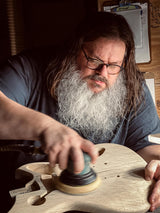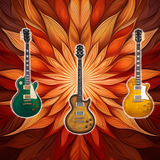Could Gibson Les Paul be the most iconic guitar in history? Possibly. Without a doubt, it's one of a kind, instantly recognizable: single-cut body equipped with dual humbuckers, two-piece hardtail bridge, 24.75 inch scale and a big headstock with 3 tuners on each side. If not for the lower cut in the body, it would be a perfectly symmetrical guitar shape. Les Paul evolved over the years, and currently multiple different versions are being produced, recreating distinct styles of this guitar: early 50s models, LP Customs from 1960s, Deluxe of the 1970s, and very modern guitars featuring locking tuners, custom painting, and Floyd Rose bridges.
Although they all differ a bit, the essence of a Les Paul stays the same. We'll focus on the best boutique alternatives to this iconic model produced by Gibson. We'll discuss guitars in various price ranges, so make sure you give it good read.
Maybach Lester
If you're looking for an alternative to the Les Paul Standard line, with a high quality of making and more vintage specs (call it a "replica"), Maybach Lester series may be your choice. Produced in Czechia and owned by a German music group, they present stunning value for their price. They are well made, and the woods and parts are as good as it gets in the 2000 Euro range. You can select from variety of models, from the 50s style (Black Velvet, Cherry Lane, Earl Grey) to the Custom (Edelweiss). Maybach guitars stay pretty close to the originals, offering different neck profiles, finishes (goldtops, plain tops, flamed maple tops), a variety of relic options, and so on. You can even go for custom-made ones with more selection of woods, better relic options, and personalization. Very high value for the money in a moderate price range.

Check out the Lester 58 in our store!
Eastman SB

If you'd like a nice homage to the Les Paul style guitars but you prefer a bit more customized designs, the Eastman SB series might be right up your alley.
Eastman is an American brand with its main production done in China. The stereotype of mediocre quality of asian-made guitars flies out of the window here, as Eastman guitars are simply stunning. The selection of LP-style guitars might not be as impressive as Maybach's, yet the models provide a bit more modern feel with updates to the classic single-cut design. For example, the neck of SB-59 reminds us more of a V-neck than your regular "baseball bat". The body shape is a tad slimmer with updated contours.
You can get more vintage, reliced ones (like the SB-55) or very shiny, elegant ones with stunning tops (check out SB59/TV). We also shouldn't forget the less conservative tonewood selection, with One-Piece Okoume bodies as a great example. It's not common to have this quality and value in this price range (sub 2500 Euro). It looks and feels closer to a custom-shop tier guitar, so you will be happy.
Heritage H-150
Enter the USA-made guitars sourcing directly from Gibson's... well, heritage.. Back in 1985, disappointed with Gibson's strategy and changes, a group of original employees decided to buy out the Kalamazoo factory along with the equipment and started their brand called Heritage Guitars. Just listen to what they say:
Our founders shared a wealth of guitar-building experience and an unwavering belief that every guitar should be as unique as the musician who plays it. It wasn't long before people took notice and started bringing their stories to us — we introduced our first guitar at the 1985 NAMM show and haven't looked back since.
Heritage Guitars is a brand well-recognized among Gibson aficionados. Their Standard series H-150 model appeals to those who want a custom shop USA-made guitar with a bit more "oooomph". Its instantly recognizable, trapezoid headstock fits nicely with a classic-looking Les Paul style body. The specs are also very close to the originals: mahogany one-piece body and neck, rosewood fretboard, maple tops, and 24.75" scale. It's just what you'd expect from a finely crafted Les Paul, with a twist (and outstanding quality control).
Knaggs Kenai

It would be impossible for us not to mention Joe Knaggs and his amazing guitars when talking about Les Paul alternatives. Joe, ex-PRS Guitars director, decided to go his own path and currently creates guitars in east coast of USA, near Washington, under Knaggs brand.
If you don't care for staying true to the vintage LP specs but you want something modern, perfectly designed with the highest quality of materials (which also comes at a price, we're talking 6000 Euro or more, depending on the tier) - Knaggs Kenai is something worth considering. Kenai draws from Les Paul's origins but takes the design to an entirely new level. The body shape is highly refined, the contours are smooth, and the finish is perfection. The one-part, proprietary bridge is in-house made and provides stellar resonance. Wood selection includes top-notch mahogany, maple, and ebony (not only for the fretboard but also for the headstock veneer).
Being a real custom shop, Knagg Guitars also gives you a huge range of options to choose from. Even the basic models deliver the highest quality you can wish for (think very best PRS quality), and on top of that you can modify woods, pickups, and finishes.
If your heart wants a modern rendition of an LP style guitar with extreme quality, and your wallet can afford it - Knaggs is the way to go.
PRS 594

Ok, we mentioned Joe Knaggs, so it would be unfair for Paul Reed Smith to not include his amazing creation - 594 model. Originally designed for Ted McCarty, former president of Gibson Guitar Corporation, pays a great tribute to Les Paul.
In the late 1980’s, Paul Reed Smith called on Ted McCarty to consult with him on guitar design and production techniques. He not only served as a mentor but became a great friend of Paul and everyone he met at PRS. In 1994, PRS released the first McCarty, an instrument that incorporated the full spectrum of techniques and knowledge Paul had gained from Ted as well as his own experiences as a guitar builder.
Starting with the name: 594 refers to refined scale: 24.594". Very strange number you say, but according to Paul Reed Smith that's the scale length that delivers the harmonic goodness at its best. Also, the pickups are custom-wound by PRS, juicy, rich sounding humbucker that deliver exceptional tones both in the full as well as in coil-tap mode. Two-piece bridge is also redefined. Some other things, such as wood combination, fretboard radius and set-neck construction stay, but come with a usual PRS-like quality.
For those who love PRS guitars but want a Les Paul style guitar in their collection 594 model is a definite answer.
Collings CL

Let's go to Texas for a moment, shall we. Once you try a Collings chances are your look at electric guitars quality will never be the same. After all, a guitar is just few pieces of wood and a bunch of metal stuck together so we can strum along to "Highway to hell", right?
Not necessarily. True craftsmanship, such as presented by Collings, takes this "simple" luthier made product to yet another level. A great example would be their CL model. On paper, the specs are close to its predecessor, with some interesting changes: more modern 12" radius, and surprising scale length of 24 7/8". The emphasis put in the specsheet on "extra long mortise & tenon" will definitely be in the ballpark of those who consider a long tenon as the only way to put the neck and body together. And their hard-case is absolutely one of a kind, it just makes you stare at the guitar inside.
Something you cannot easily learn from photos presenting their stunning looks or YouTube videos is how resonant, responsive and dynamic these guitars are. It's like having an great acoustic guitar put in a solidbody and more. You want tone - you got it. We must warn you, thought. This level of quality comes at a price - you are looking at around 7000 Euro.
Ivison Hurricane
Chances are that you once dreamed about a guitar. Maybe it was a 1959 Gibson LEs Paul. You know what we're talking about - comfy yet full enck, great flame top, the burst, the sonic goodness. Well, we once dreamed (literally) about the Ivison Hurricane 59. It's only when you encounter one in person until you are able to fully comprehend how high quality current boutique guitars are.
Based in UK, the experienced luthier and guitar tech Neil Ivison started his brand in 2018. Since then Ivison Guitars are gaining attention and that is for a reason.You can definitely talk about msterbuilt pieces here, with high quality and lots of handwork. The list of artists equipped with Ivison Gutiars is growing, featuring Audley Freed, Richard Fortus, and Keifer Sutherland among others.
McInturff Carolina Custom

Terry McInturff is a legend, so if you're not familiar with his name and works, go and do your homework. Terry made guitars for Eric Clapton, Jimmy Page, and Robert Fripp. That speaks for itself.
Working on his own, even in his elder years Terry is delivering guitars of quality without compromise. There isn't a proper discussion about LP alternatives without his name popping up. These are fully customized, made to your taste if you purchase from the maker directly.
Carolina Custom is an appealing, boutique alternative to the 1959 Les Paul, featuring flat-top, as opposed to the curved lines of Les Paul, which might be a nice refreshing challenge to a classic looks. The outer body lines are customized, as well as the headstock's shape. Some other things, such as the radius and scale length, are modernized, but deep inside, it's a Les Paul on steroids.
Very, very rare in a second-hand market, which also suggests that owners are not fond of getting rid of these. Whether new or used, you're looking at around 5000 Euro.
Nik Huber Orca
Last but not least, another instance piece of (pricey but goody) guitar artistry. Nik Huber is a brand that many Europeans are already familiar with, and to those who want a refined and perfected rendition of a Les Paul, their flagship - Orca - might be a bull's-eye.
Once you see it, you will remember it forever. The updated contours and shape, the headstock, the smooth satin finish, and the eye-catching wood choices are to die for. The highest versions of Orca feature even Brazilian rosewood (now very limited, expensive, and protected wood). You will, of course, find a mahogany body and neck. In addition to that, we have an ebony headstock veneer and a handwound Häussel 59 pickup set.
Modernized features are compound 10-14" radius and 25" scale (Suhr meets PRS in that one). Color choices are limited, but all of them are mind-blowing, and as a cherry on top, there are orca-shaped fretboard inlays. Needless to say, the price for a fully customized, top-tier Orca can reach 10 thousand Euro, but once you get your hands on one, you'll understand why and never look back.



